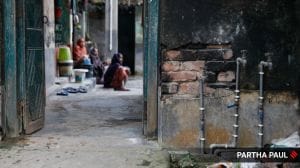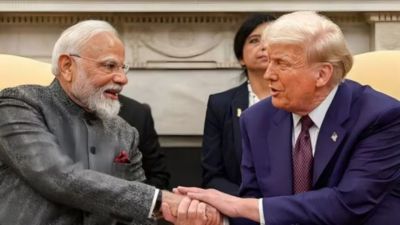A month into the standoff between Indian and Chinese troops at the trijunction with Bhutan, Prime Minister Narendra Modi, Defence and Finance Minister Arun Jaitley and External Affairs Minister Sushma Swaraj Tuesday discussed the Doklam faceoff with visiting Australian Foreign Minister Julie Bishop. This is the first time that New Delhi has discussed the standoff with a visiting foreign leader.
Worried over the possibility of “escalation of tensions” between India and China, Bishop, on her part, urged New Delhi and Beijing to resolve the issue peacefully because Australia did not want to see any escalation that could result in “miscalculation” and “misjudgement”.

The Australian Foreign Minister’s carefully chosen words reflected the sense of unease in the international community over the tension between India and China.
Story continues below this ad
After meeting Modi, Jaitley and Swaraj, Bishop confirmed that the Doklam standoff was a “subject of discussion” with all three leaders. The Prime Minister’s Office, in a statement, said Modi and Bishop discussed “regional and global issues of mutual interest”.
Speaking to a group of mediapersons, Bishop said, “My understanding is that this is a long-term dispute… it was the subject of discussion today. Australia’s position is that territorial disputes should be resolved peacefully between the claimant countries. And in case of maritime disputes, it should be subject to UNCLOS (United Nations Convention on the Law of the Sea). Likewise, with land disputes, these should be resolved peacefully between competing claimants. And we urge countries to do that. We don’t want to see any escalation of tensions that could lead to miscalculation and misjudgement.”
The Indian government’s outreach with a strategic partner is the first such diplomatic move, and is being perceived as New Delhi’s effort to brief the international community on the Indian version of events.
Shortly after the standoff began, Modi visited Israel and then travelled to Hamburg in Germany for the G-20 summit, and there was no mention of “discussions” on the border crisis with any G-20 leader. His only conversation with Chinese President Xi Jinping, according to the Ministry of External Affairs, had “covered a range of issues” — without specifying whether Doklam was discussed.
Story continues below this ad
On Tuesday, The Indian Express reported that China has conveyed to foreign diplomats in Beijing that troops of the People’s Liberation Army (PLA) have been waiting patiently at the plateau — China claims the Bhutanese land at the trijunction with India and calls it Donglong — but will not wait for an indefinite period.
Bishop, who enumerated China’s close and deep ties with Australia, also underlined that Beijing has an “increasingly assertive foreign policy”, and Australia emphasises rule-based order and freedom of navigation — two-third of Australia’s merchandise trade crosses the South China Sea.
At their meeting, Modi welcomed Australia joining the International Solar Alliance (ISA) and said it will provide a great boost to the grouping.
Before calling on the Prime Minister, Bishop signed the Framework Agreement to join the ISA, a common platform for cooperation among sun-rich countries. The initiative was launched at the Climate Change conference in Paris in 2015 by Modi and Francois Hollande, then President of France.
Story continues below this ad
She also clarified to Swaraj, during her discussions, that the change in the 457 visa programme will not impact Indian skilled professionals — 457 has been the most common visa for Australian or overseas employers to sponsor skilled overseas workers to work temporarily in Australia.
On Australia not being included in the Malabar exercise, Bishop said “it was not upsetting” and partnership in military exercises was up to each country. She outlined that there were different combinations and they were working with the Indian government to build on the defence partnership.

 External Affairs Minister Sushma Swaraj with her Australian counterpart Julie Bishop in New Delhi on Tuesday. (PTI photo)
External Affairs Minister Sushma Swaraj with her Australian counterpart Julie Bishop in New Delhi on Tuesday. (PTI photo)






